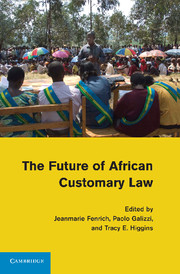Book contents
- Frontmatter
- Contents
- Notes on Contributors
- Acknowledgments
- Introduction
- Part One The Nature and Future of Customary Law
- Part Two Ascertainment, Application, and Codification of Customary Law
- 4 The Quest for Customary Law in African State Courts
- 5 The Withering Province of Customary Law in Kenya
- 6 Putting Old Wine in New Wine Skins
- 7 Traditional Authorities
- 8 Engaging Legal Dualism
- 9 The Future of Customary Law in Ghana
- Part Three The Role and Power of Traditional Authorities
- Part Four Customary Land, Property Rights, and Succession
- Part Five Customary Criminal Law
- Part Six Customary Law, Human Rights, and Gender Equality
- Index
- References
6 - Putting Old Wine in New Wine Skins
The Customary Code of Lerotholi and Justice Administration in Lesotho
Published online by Cambridge University Press: 05 February 2012
- Frontmatter
- Contents
- Notes on Contributors
- Acknowledgments
- Introduction
- Part One The Nature and Future of Customary Law
- Part Two Ascertainment, Application, and Codification of Customary Law
- 4 The Quest for Customary Law in African State Courts
- 5 The Withering Province of Customary Law in Kenya
- 6 Putting Old Wine in New Wine Skins
- 7 Traditional Authorities
- 8 Engaging Legal Dualism
- 9 The Future of Customary Law in Ghana
- Part Three The Role and Power of Traditional Authorities
- Part Four Customary Land, Property Rights, and Succession
- Part Five Customary Criminal Law
- Part Six Customary Law, Human Rights, and Gender Equality
- Index
- References
Summary
Introduction
Although the interaction between the western colonizers and the African indigenous populations in the early eighteenth and nineteenth centuries produced responses that were mostly inimical to the development of African customary law, the thrust of the onslaught against its principles was somewhat diminished by political considerations. Undoubtedly, the significance that African customary law acquired during this period was a measure of the purpose that the colonial project found in it. In the British-controlled areas especially, such a purpose was coterminous with the demands of indirect rule that saw the native administrators, mainly the chiefs, being coopted into the colonial civil service, and dualism being entrenched into the legal system. Nonetheless, the colonial project, based on racist and pluralistic foundations, still manifested clear goals of civilizing the “native” and gradually phasing out what it perceived to be “primitive” law. To achieve the dual purpose of civilizing the native and, at the same time, maintaining the political hold on the territories, the colonial project adopted an approach that sought a reinvention of African customary law so that its principles could support the smooth operation of the colonial justice systems. In some countries, this necessitated the codification or restatement of customary laws.
- Type
- Chapter
- Information
- The Future of African Customary Law , pp. 129 - 152Publisher: Cambridge University PressPrint publication year: 2011



